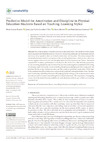Identificador persistente para citar o vincular este elemento:
https://accedacris.ulpgc.es/jspui/handle/10553/77149
| Campo DC | Valor | idioma |
|---|---|---|
| dc.contributor.author | Leyton-Román, Marta | en_US |
| dc.contributor.author | León González-Vélez, Jaime José | en_US |
| dc.contributor.author | Batista, Marco | en_US |
| dc.contributor.author | Jiménez-Castuera, Ruth | en_US |
| dc.date.accessioned | 2021-01-13T17:36:57Z | - |
| dc.date.available | 2021-01-13T17:36:57Z | - |
| dc.date.issued | 2021 | en_US |
| dc.identifier.other | Scopus | - |
| dc.identifier.uri | https://accedacris.ulpgc.es/handle/10553/77149 | - |
| dc.description.abstract | One of the purposes of teachers is to ensure the motivation of the students in their classes and to maintain disciplined behaviours. However, the teaching styles and methodologies used do not always have a positive effect on student’s motivation and discipline. This study analysed the relationship between student’s perceptions of the controlling behaviours of their physical education teacher, together with amotivation and discipline styles from Self-Determination Theory. The sample comprised 922 students, aged between 14 and 18 years (M = 14.95; SD = 0.98). Students’ perceptions of less controlling discipline styles (control of the use of rewards) negatively predicted the thwarting of autonomy need. Conversely, a more controlling discipline style (judging and devaluing) positively predicted the thwarting of autonomy need, and this, positively predicted amotivation, which negatively predicted disciplinary behaviours and positively predicted undisciplined behaviours. Teachers must avoid using controlling behaviours like judging and devaluing, as this reinforces amotivation towards physical education and undisciplined student behaviours. The importance of designing classes where the student has responsibilities to make decisions and to be part of their own learning is pointed out. | en_US |
| dc.language | eng | en_US |
| dc.relation.ispartof | Sustainability (Switzerland) | en_US |
| dc.source | Sustainability (Switzerland) [EISSN 2071-1050],v. 13 (1), p. 1-14, (Enero 2021) | en_US |
| dc.subject | 58 Pedagogía | en_US |
| dc.subject | 61 Psicología | en_US |
| dc.subject.other | Controlling Behaviours | en_US |
| dc.subject.other | Motivation | en_US |
| dc.subject.other | Self-Determination Theory | en_US |
| dc.subject.other | Undiscipline | en_US |
| dc.title | Predictive model for amotivation and discipline in physical education students based on teaching–learning styles | en_US |
| dc.type | info:eu-repo/semantics/Article | en_US |
| dc.type | Article | en_US |
| dc.identifier.doi | 10.3390/su13010187 | en_US |
| dc.identifier.scopus | 85098540724 | - |
| dc.contributor.authorscopusid | 55680973200 | - |
| dc.contributor.authorscopusid | 57221224290 | - |
| dc.contributor.authorscopusid | 55382254700 | - |
| dc.contributor.authorscopusid | 57219890999 | - |
| dc.identifier.eissn | 2071-1050 | - |
| dc.description.lastpage | 14 | en_US |
| dc.identifier.issue | 1 | - |
| dc.description.firstpage | 1 | en_US |
| dc.relation.volume | 13 | en_US |
| dc.investigacion | Ciencias Sociales y Jurídicas | en_US |
| dc.type2 | Artículo | en_US |
| dc.utils.revision | Sí | en_US |
| dc.date.coverdate | Enero 2021 | en_US |
| dc.identifier.ulpgc | Sí | en_US |
| dc.contributor.buulpgc | BU-EGB | en_US |
| dc.description.sjr | 0,664 | |
| dc.description.jcr | 3,889 | |
| dc.description.sjrq | Q1 | |
| dc.description.jcrq | Q2 | |
| dc.description.scie | SCIE | |
| dc.description.ssci | SSCI | |
| dc.description.miaricds | 10,6 | |
| dc.description.erihplus | ERIH PLUS | |
| item.grantfulltext | open | - |
| item.fulltext | Con texto completo | - |
| crisitem.author.dept | GIR IATEXT: Didáctica, Aprendizaje y Motivación en Contextos Específicos | - |
| crisitem.author.dept | IU de Análisis y Aplicaciones Textuales | - |
| crisitem.author.dept | Departamento de Educación | - |
| crisitem.author.orcid | 0000-0002-9587-4047 | - |
| crisitem.author.parentorg | IU de Análisis y Aplicaciones Textuales | - |
| crisitem.author.fullName | León González-Vélez, Jaime José | - |
| Colección: | Artículos | |
Citas SCOPUSTM
10
actualizado el 08-jun-2025
Citas de WEB OF SCIENCETM
Citations
7
actualizado el 22-feb-2026
Visitas 5
117
actualizado el 10-ene-2026
Descargas
98
actualizado el 10-ene-2026
Google ScholarTM
Verifica
Altmetric
Comparte
Exporta metadatos
Los elementos en ULPGC accedaCRIS están protegidos por derechos de autor con todos los derechos reservados, a menos que se indique lo contrario.
